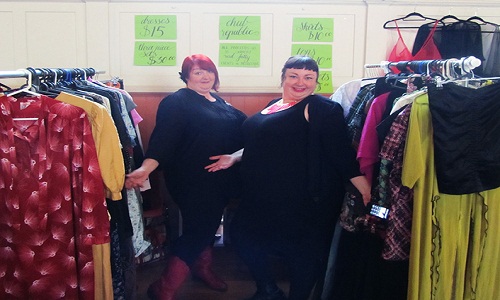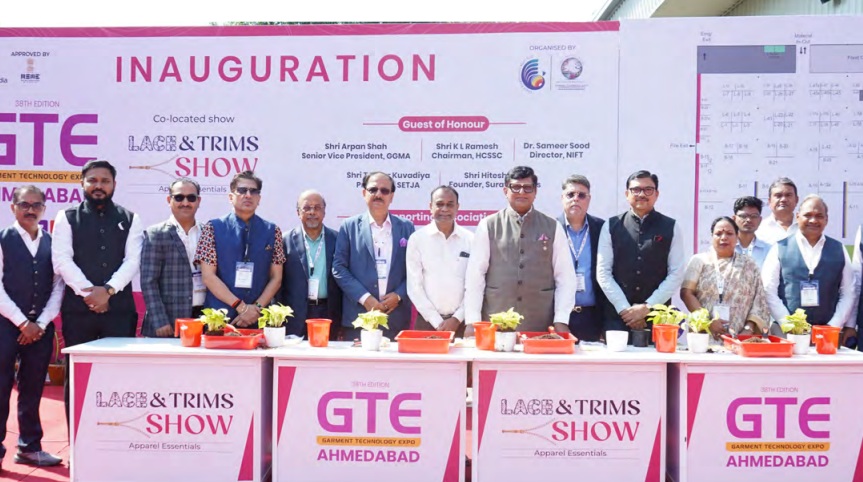FW
"While fashion shows and women’s glossies are filled with hyper-thin girls, the reality is their body types don’t come close to representing the average American woman. According to researchers, social media has helped spur a wake-up call that has stores, brands and even magazines, realizing the plus-size customer is not just underserved, but that the category is likely filled with pent-up demand."

Research shows social media has been a significant driver in changing the industry’s attitude toward plus customers.While fashion shows and women’s glossies are filled with hyper-thin girls, the reality is their body types don’t come close to representing the average American woman. According to researchers, social media has helped spur a wake-up call that has stores, brands and even magazines, realizing the plus-size customer is not just underserved, but that the category is likely filled with pent-up demand.
According to the Institute for Health Metrics, most adult women in the U.S. don’t fit into single-digit sizes (the average is 14), much less a runway model’s size 0 or 2. The fact is, 160 million American adults are considered overweight or obese. Among women, almost two-thirds (64 per cent) fall into this category, according to the National Institutes of Health. Thirty-six per cent are considered obese and 8 per cent extremely obese. This rate has been relatively stable since 2010. The NPD Group’s 2015 Women’s Special Size Study revealed the number of teens buying plus-size clothes has nearly doubled - from 19 per cent to 34 per cent - since 2012.

This is a $17.5 billion market, according to The NPD Group, but has the potential for marked growth. Just half of all plus women say they ‘love or enjoy shopping,’ which is significantly less than their non-plus counterparts at 64 per cent, according to a survey. And plus shoppers spend about $42 per month on clothing, which is 37 per cent less than the $67 spent by non-plus women.
Exceptional year
Says Fullbeauty Brands spokesperson Dasheeda Dawson, if 2015 was a breakthrough year for plus women and fashion, this year is shaping up to be even more exceptional. Fullbeauty has a number of brands in its stable including Woman Within, Roamans and, more recently, Violeta by Mango. Its ‘Swimsuits4All brand’ launched the curves in bikinis plus-size swimwear campaign in 2015. Featuring plus model Ashley Graham, the campaign was driven by one of the most talked about ads in the Sports Illustrated swimsuit issue.
The newness in the category will help ease the frustration plus shoppers feel. Mintel, a global market research firm, released a report that shows 16 per cent of plus women buy what fits although it doesn’t necessarily mean they like the clothes. Further, Mintel’s found 21 per cent of plus-size shoppers think the styles they really like do not look good on them. However, women under age 45 are more likely than those over 45 to have positive outlooks.
Demand for natural fibers
Actress Melissa McCarthy actually took issue with the term ‘plus-size’ when she introduced her Seven7 line of apparel late last year. McCarthy’s collection runs from missy size 4 up to size 28 and is carried in a range of stores, including Lane Bryant, Macy’s, Evans, and Nordstrom. Online retailer ModCloth also ditched the ‘plus’ nomenclature, opting instead for ‘Extended Sizes’ among the brands that go beyond 12.
According to data available, the fact is 77 per cent of plus women say better quality garments are made from all natural fibers such as cotton. And slightly more than half of all plus-size women (51 per cent) are willing to pay more for natural fibers.
When listing the important factors in buying clothes, plus shoppers put fit (78 per cent) at the top, followed by comfort (75 per cent) and then price (67 per cent), data shows. Style (35 per cent) is significantly less important to them than non-plus shoppers (44 per cent). But with the influx of new brands and retailers in the category, that is likely to change.
Bloggers and other consumer advocates have also been successful at influencing retailers to offer plus size…options and to reconsider how they price and market such clothing.
Because of its strong social and website contact, Dawson says Fullbeauty Brands knows its customer expects, and in many cases demands, more fashionable options.
India’s blended spun yarn export value was up 11.2 per cent year on year while volumes rose 19.5 per cent as compared to the same month last year.
Polyester cotton yarns was exported to 53 countries in April 2016, of which Bangladesh and Egypt were the largest importers followed by Colombia. Turkey, Honduras, Spain, Brazil and South Africa were the fastest growing markets for PC yarns while South Korea significantly reduced its import of PC yarns from India.
Saudi Arabia and Pakistan were among the 10 countries that did not import any PC yarns from India during April. Iran was the major destination among the 14 new markets found during the month.
In April, polyester viscose yarns were exported to 30 countries from India with volumes at 3.3 million kgs. Turkey continued to be the largest importer, with a 63.23 per cent share of the total volume exported from India during the month.
Iran, Japan, Russia and Argentina were the fastest growing markets for PV yarn while Honduras and Romania were the new major markets for PV yarn. Six countries did not import any PV yarn during the month, including the major ones like Peru, Uganda and Tanzania.
Also, acrylic and cotton yarn prices were down 16 per cent year on year in April.
For the first four months of 2016 the total value of retail sales in Hong Kong decreased by 11.4 per cent compared with the same period in 2015.The value of retail sales in April 2016 was down 7.5 per cent compared with the same month of 2015.
In April 2016 compared with April 2015, the value of retail sales of jewelry, watches and clocks, and valuable gifts decreased by 16.6 per cent; clothing fell 5.9 per cent; electrical goods and photographic equipment was down 23 per cent; miscellaneous consumer durable goods fell 31.6 per cent; motor vehicles and parts fell 5.4 percent; footwear , allied products and other clothing accessories down 5.8 per cent; books, newspapers, stationery and gifts fell 9.4 per cent; medicine fell 0.9 per cent and optical shops fell 9.3 per cent.
On the other hand, in April 2016 compared with the same month in 2015, the value of retail sales of commodities in supermarkets increased by 2.4 percent; pharmaceutical and cosmetics increased by 1.7 per cent; food, alcoholic drinks and silt grass were up five per cent.
Up to three months of the end of April 2016, compared with the preceding three months, the value of total retail sales fell a seasonally adjusted 2.1 per cent while the volume of total retail sales fell by a seasonally adjusted 3.1 per cent.
Small and medium-sized enterprises in Estonia stand to gain from the Transatlantic Trade and Investment Partnership (TTIP), the trade agreement being negotiated between the European Union and the US. Estonia’s exports to the United States could rise by as much as 13 per cent when the agreement is concluded.
Small and medium enterprises will benefit from the reduction in tariffs resulting from the agreement, especially in sectors where such businesses make up a large portion of businesses such as in the food, garment and textile industry. The reduction in non-tariff barriers will also be good, since small companies have less money to deal with red tape.
Estonian small and medium enterprises are champions in transatlantic trade compared with businesses in other member states, as among the companies exporting to the US they account for 65 per cent of total exports – the highest indicator in the EU.
The EU-United States transatlantic economy represents the largest economic relationship in the world, accounting for more than 40 per cent of world trade. Negotiations on the TTIP opened in July 2013, with the goals of eliminating duties and other restrictions on trade in goods; freeing up commercial services; and providing the highest possible protection, certainty, and level playing field for American and European investors.
Pitti Immagine’s main strategy will be to continue to enhance Pitti Umo’s influence in Asia. It hopes the Chinese media and more high quality buyers understand Pitti Umo, so that they know they can find what they want at Pitti Uomo. The intention is to let Italian men’s brands be recognized by Chinese consumers and contacts.
The belief is that overseas buyers are playing a big role in the fashion industry and their proportion is continuing to increase in Pitti Umo, which is the world's most important men's fashion event. It includes not only fashion but lifestyle in terms of new clothing, accessories, as well as a variety of products. Asian markets are increasingly being compared to Western markets and more and more attention is being focused on the future course of business in Asia as in terms of future prospects profits in Asian markets could be bigger.
The Pitti Uomo menswear show will be held June 14 to 17, in Florence, Italy. At last year's show, 41 per cent of buyers were from overseas, from countries such as Japan, China and South Korea. This year is the 90th anniversary of Pitti Uomo.
Pitti Immagine sees great potential in Chinese designers and feel they should cater to Chinese tastes instead of turning to western inspired designs. The idea is to narrow the distance between consumers and fashion as not all of the pioneer designs and not all of the avant-garde designs are accepted.
So while young Chinese designers are educated, they also need to know what works and never forget their roots. So while they may be open to outside influences, they need to pay attention to consumer needs, cut out what’s fancy or outlandish, and attempt to blend China’s local culture and fashion together.
This year Pitti Immagine is trying a new technology called ready-to-order APP. This involves many small-scale garment manufacturers who may have a great design or quality or some young designer with promise. They can participate in the show. It is expected to help in smoother communication between visitors and vendors and more convenient business contacts.
The G-III Apparel Group, based in the United States, has reported fiscal first quarter earnings of 2.8 million dollars. Profits are six cents per share. The results topped Wall Street expectations.
The clothing and accessories maker posted revenues of 457.4 million dollars in the period. For the current quarter ending in August, G-III Apparel expects revenue in the range of 485 million dollars. The company expects full-year earnings to be 2.55 dollars to 2.65 dollars per share, with revenue expected to be 2.56 billion dollars.
G-III Apparel shares have fallen 12 per cent since the beginning of the year. The stock has declined 31 per cent in the last 12 months.
G-III Apparel, founded in 1956, designs, manufactures and markets men’s and women’s apparel. It operates through two segments, wholesale operations and retail operations. It makes outerwear, dresses, sportswear, swimwear, women’s suits, women’s performance wear; and women’s handbags, footwear, small leather goods, cold weather accessories, and luggage.
The company offers its products to department, specialty, and mass merchant retail stores in the United States, Canada, Europe and the Far East and distributes products through its retail stores as well as through G.H. Bass, Wilsons Leather, Vilebrequin, and Andrew Marc websites. As of January 31, 2016, it operated 199 Wilsons Leather stores, 163 G.H. Bass stores, and five Calvin Klein performance stores.
American factories expanded for the third straight month in May, helped by a weaker dollar.Orders to US factories for long-lasting manufactured goods rose 3.4 per cent in April, the most since January. Most of the April strength came from the volatile commercial aircraft category.
The index was stuck below 50 from October through February as American factories struggled with economic weakness abroad and a strong dollar that made US products more expensive in foreign markets. The dollar has fallen against other major currencies since the end of January, giving factories some relief.
Manufacturing has stabilized. The weaker dollar this year has already made a material difference to exporters.
Manufacturers' new orders and production grew more slowly in May. Export orders and a measure of employment were unchanged. The index was pulled up by an increase in deliveries from suppliers. Overall, 12 of 18 manufacturing industries reported growth last month, led by wood products manufacturers and textile mills.
The US economy got off to a rough start this year, growing at a lackluster 0.8 per cent annual pace from January through March. Manufacturers' troubles weighed on growth. The growth rate is expected to rise to perhaps 2.5 per cent in the second quarter as a robust American job market gives consumers the incomes and confidence to spend more. Employers have added a healthy 2.7 million jobs over the past year.
According to Vu Duc Giang, Chair of the Vietnam Textile and Apparel Association (Vinatas), the Vietnam’s textile & garment industry is facing big challenges. Giang said many small and medium enterprises have had to shut down because they could not get orders to retain jobs.
A lot of partners have shifted to place orders with Myanmar and Lao instead of Vietnam because exporters from the two countries can enjoy preferential tariffs when exporting goods to US and European markets.
Meanwhile, Le Quang Hung, chair of Garmex Saigon, said he was worried about the strong rise of rivals from Myanmar, Laos, Cambodia and Bangladesh, admitting that the companies there can fulfill orders at more competitive prices than Vietnamese companies thanks to the lower labor costs.
However, Hung said that the problem was not too serious for the company because Garmex Saigon in recent years has been gathering strength on making products which require high-level technique.
At the enterprise with more than 4,000 workers, the factories in Vung Tau City and Quang Nam province, which have lower production costs, are in charge of making products which do not require high technique, such as T-shirt and jeans. Meanwhile, its factory in HCM City focuses on implementing high-value orders which require higher technical standards.
TSI Yarns has joined Atlanta-based industrial fiber distributor Hamilton International. The transaction combines Hamilton’s fiber sourcing expertise with TSI Yarns’ manufacturing and development, expanding the range and capabilities of both companies.
TSI can produce 4,50,000 pounds of textured yarns per week at its modern, ISO 9001 certified facility. Access to raw materials available through other Hamilton businesses expands the range of solutions that TSI Yarns can provide to its customers.
The investment and enthusiasm that comes from being part of an organization committed to growth and American manufacturing gives TSI Yarns a unique opportunity to expand its products and services solutions.
TSI Yarns, founded in 1987, is a diversified air jet texturing business serving the global knitting and weaving industries. It offers an excellent selection of air jet yarns that are ideal for textile manufacturing. Using an effective air jet spinning technique, the company creates yarn that is tough and versatile. Products include nylon, polyester, and a variety of flame resistant fibers. The company produces upwards of 3,00,000 pounds of high-quality textured yarns per week, ranging from 140 to 4000 denier on modern air texturing machines. It provides technical, testing guidelines, and application information for all products to ensure optimum performance.
Texperts, based in Mumbai, is an international textile sourcing and marketing organisation which offers its services to garment industry businesses. It is gearing up to establish trade links with Myanmar garment entrepreneurs. Texperts will attempt to extend its business dealings by making agreements with garment factories based in Myanmar.
Texperts facilitates international trade of about 10,000 tons per month in fibers, yarns, fabrics and garments. It specializes in functional, industrial and technical textiles. It has an expert team handling polyester high tenacity yarn products for industrial applications.
Texperts runs successful and well established garment factories based in India. Since its inception, in 2002, Texperts has been providing expert solutions for the supply of fiber, yarn, fabrics and garments from the most sorted destinations of the world. Texperts regularly conceives, develops and tracks new products as well as identifies and recommends suitable suppliers for such new products. Due to the proficient solutions in various segments of textiles, Texperts has a prominent presence in 70 countries across all continents.
This expertise has given rise to category specific brands like Solemio and Fitz under the mother brand of Texperts. These brands cater to the age groups 20 to 35. Solemio and Fitz have an Indian soul, yet an international outlook.












